The teachings on love given by the Buddha are clear, scientific, and applicable… Love, compassion, joy, and equanimity are the very nature of an enlightened person. They are the four aspects of true love within ourselves and within everyone and everything. – Thich Nhat Hanh
Teachings on True Love by Thich Nhat Hahn
Happiness is only possible with true love. True love has the power to heal and transform the situation around us and bring a deep meaning to our lives. There are people who understand the nature of true love and how to generate and nurture it. The teachings on love given by the Buddha are clear, scientific, and applicable. Every one of us can benefit from these teachings.
During the lifetime of the Buddha, those of the Brahmanic faith prayed that after death they would go to Heaven to dwell eternally with Brahma, the universal God. One day a Brahman man asked the Buddha, “What can I do to be sure that I will be with Brahma after I die?” and the Buddha replied, “As Brahma is the source of Love, to dwell with him you must practice the Brahmaviharas—love, compassion, joy, and equanimity.”
A vihara is an abode or a dwelling place. Love in Sanskrit is maitri; in Pali it is metta. Compassion is karuna in both languages. Joy is mudita. Equanimity is upeksha in Sanskrit and upekkha in Pali. The Brahmaviharas are the four elements of true love. They are called “immeasurable,” because if you practice them, they will grow in you every day until they embrace the whole world. You will become happier, and everyone around you will become happier, also.
The Buddha respected people’s desire to practice their own faith, so he answered the Brahman’s question in a way that encouraged him to do so. If you enjoy sitting meditation, practice sitting meditation. If you enjoy walking meditation, practice walking meditation. But preserve your Jewish, Christian, or Muslim roots. That is the way to continue the Buddha’s spirit. If you are cut off from your roots, you cannot be happy.
If we learn ways to practice love, compassion, joy, and equanimity, we will know how to heal the illnesses of anger, sorrow, insecurity, sadness, hatred, loneliness, and unhealthy attachments… Love, compassion, joy, and equanimity are the very nature of an enlightened person.
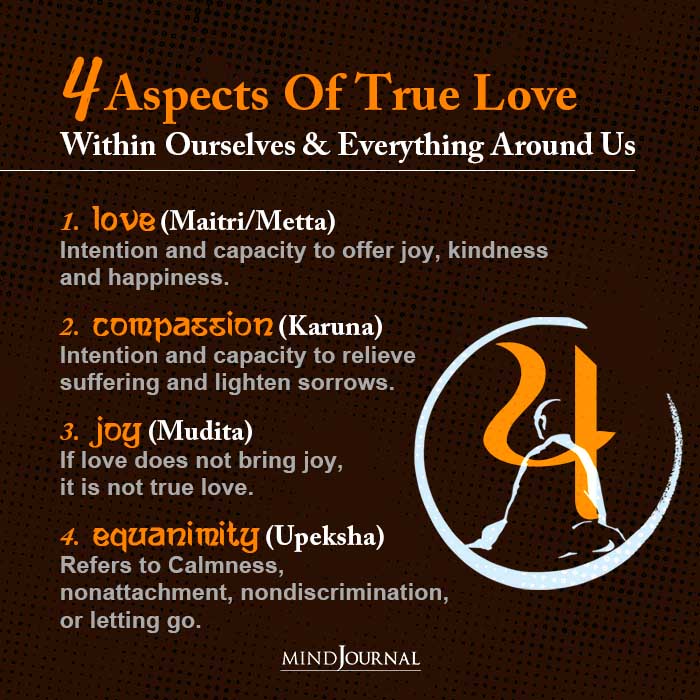
They are the four aspects of true love within ourselves and within everyone and everything.
1. Love (Maitri/Metta)
The first aspect of true love is maitri (metta, in Pali), the intention and capacity to offer joy and happiness. To develop that capacity, we have to practice looking and listening deeply so that we know what to do and what not to do to make others happy. If you offer your beloved something she does not need, that is not maitri. You have to see her real situation or what you offer might bring her unhappiness.
Without understanding, your love is not true love. You must look deeply in order to see and understand the needs, aspirations, and suffering of the one you love. We all need love. Love brings us joy and well-being. It is as natural as the air. We are loved by the air; we need fresh air to be happy and well. We are loved by trees. We need trees to be healthy. In order to be loved, we have to love, which means we have to understand. For our love to continue, we have to take the appropriate action or non-action to protect the air, the trees, and our beloved.
Maitri can be translated as “love” or “loving-kindness.” Some Buddhist teachers prefer “loving-kindness,” as they find the word “love” too dangerous. But I prefer the word “love.” Words sometimes get sick and we have to heal them. We have been using the word “love” to mean appetite or desire, as in “I love hamburgers.” We have to use language more carefully. “Love” is a beautiful word; we have to restore its meaning. The word “maitri” has roots in the word mitra which means friend. In Buddhism, the primary meaning of love is friendship.
We all have the seeds of love in us. We can develop this wonderful source of energy, nurturing the unconditional love that does not expect anything in return. When we understand someone deeply, even someone who has done us harm, we cannot resist loving him or her. Shakyamuni Buddha declared that the Buddha of the next eon will be named “Maitreya, the Buddha of Love.”

Read The Ten Fundamental Rules of Love
2. Compassion (Karuna)
The second aspect of true love is karuna, the intention and capacity to relieve and transform suffering and lighten sorrows. Karuna is usually translated as “compassion,” but that is not exactly correct. “Compassion” is composed of com (“together with”) and passion (“to suffer”). But we do not need to suffer to remove suffering from another person. Doctors, for instance, can relieve their patients’ suffering without experiencing the same disease in themselves. If we suffer too much, we may be crushed and unable to help. Still, until we find a better word, let us use “compassion” to translate karuna.
To develop compassion in ourselves, we need to practice mindful breathing, deep listening, and deep looking. The Lotus Sutra describes Avalokiteshvara as the bodhisattva who practices “looking with the eyes of compassion and listening deeply to the cries of the world.” Compassion contains deep concern. You know the other person is suffering, so you sit close to her. You look and listen deeply to her to be able to touch her pain. You are in deep communication, deep communion with her, and that alone brings some relief
One compassionate word, action, or thought can reduce another person’s suffering and bring him joy. One word can give comfort and confidence, destroy doubt, help someone avoid a mistake, reconcile a conflict, or open the door to liberation. One action can save a person’s life or help him take advantage of a rare opportunity. One thought can do the same, because thoughts always lead to words and actions. With compassion in our heart, every thought, word, and deed can bring about a miracle.
When I was a novice, I could not understand why, if the world is filled with suffering, the Buddha has such a beautiful smile. Why isn’t he disturbed by all the suffering? Later I discovered that the Buddha has enough understanding, calm, and strength; that is why the suffering does not overwhelm him. He is able to smile to suffering because he knows how to take care of it and to help transform it. We need to be aware of the suffering, but retain our clarity, calmness, and strength so we can help transform the situation. The ocean of tears cannot drown us if karuna is there. That is why the Buddha’s smile is possible.
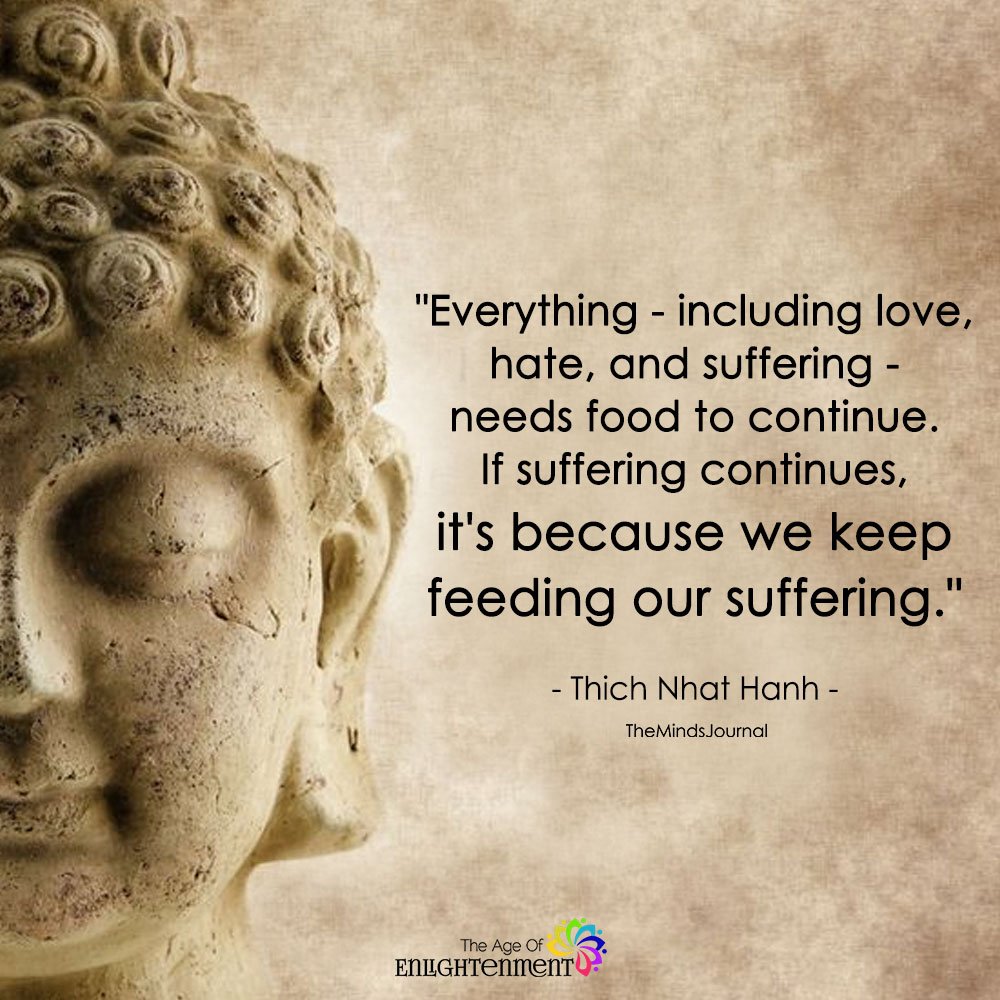
3. Joy (Mudita)
The third element of true love is mudita, joy. True love always brings joy to ourselves and to the one we love. If our love does not bring joy to both of us, it is not true love. Commentators explain that happiness relates to both body and mind, whereas joy relates primarily to mind.
This example is often given: Someone traveling in the desert sees a stream of cool water and experiences joy. On drinking the water, he experiences happiness. Ditthadhamma sukhavihari means “dwelling happily in the present moment.” We don’t rush to the future; we know that everything is here in the present moment.
Many small things can bring us tremendous joy, such as the awareness that we have eyes in good condition. We just have to open our eyes and we can see the blue sky, the violet flowers, the children, the trees, and so many other kinds of forms and colors. Dwelling in mindfulness, we can touch these wondrous and refreshing things, and our mind of joy arises naturally. Joy contains happiness and happiness contains joy.
Some commentators have said that mudita means “sympathetic joy” or “altruistic joy,” the happiness we feel when others are happy. But that is too limited. It discriminates between self and others. A deeper definition of mudita is a joy that is filled with peace and contentment. We rejoice when we see others happy, but we rejoice in our own wellbeing as well. How can we feel joy for another person when we do not feel joy for ourselves? Joy is for everyone.
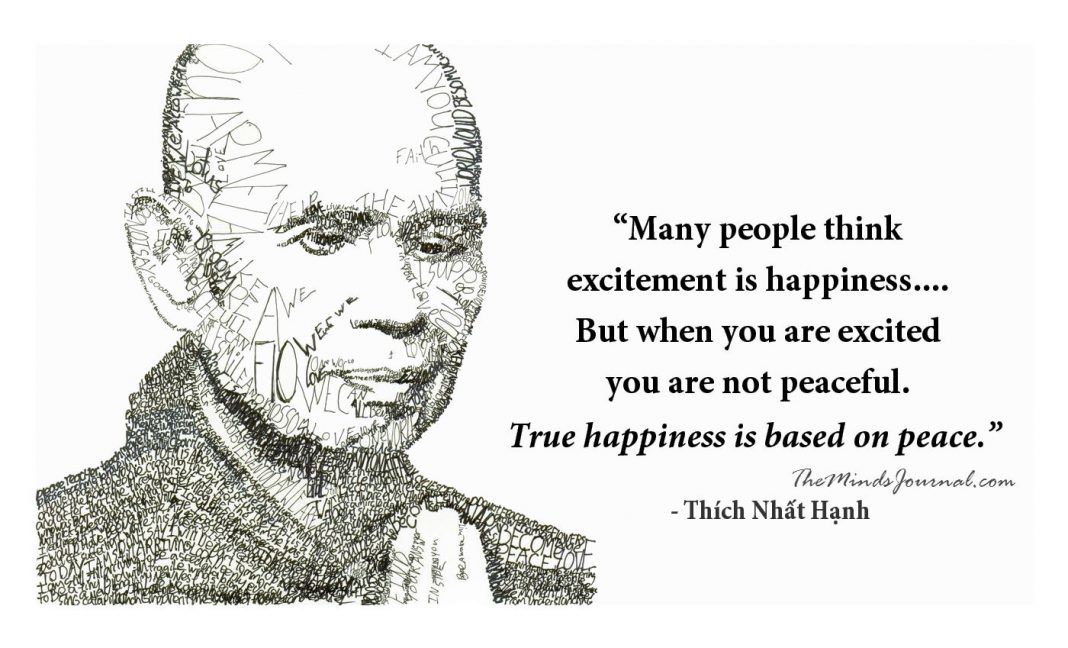
Read Learn The Art Of Enjoying Life With These 6 Helpful Tips
4. Equanimity (Upeksha)
The fourth element of true love is upeksha, which means equanimity, nonattachment, nondiscrimination, even-mindedness, or letting go. Upa means “over,” and iksha means “to look.” You climb the mountain to be able to look over the whole situation, not bound by one side or the other. If your love has attachment, discrimination, prejudice, or clinging in it, it is not true love.
People who do not understand Buddhism sometimes think upeksha means indifference, but true equanimity is neither cold nor indifferent. If you have more than one child, they are all your children. Upeksha does not mean that you don’t love. You love in a way that all your children receive your love, without discrimination.
Upeksha has the mark called samatajñana, “the wisdom of equality,” the ability to see everyone as equal, not discriminating between ourselves and others. In a, conflict, even though we are deeply concerned, we remain impartial, able to love and to understand both sides. We shed all discrimination and prejudice and remove all boundaries between ourselves and others.
As long as we see ourselves as the one who loves and the other as the one who is loved, as long as we value ourselves more than others or see ourselves as different from others, we do not have true equanimity. We have to put ourselves “into the other person’s skin” and become one with him if we want to understand and truly love him. When that happens, there is no “self’ and no “other.”
Without upeksha, your love may become possessive. A summer breeze can be very refreshing; but if we try to put it in a tin can so we can have it entirely for ourselves, the breeze will die. Our beloved is the same. He is like a cloud, a breeze, a flower. If you imprison him in a tin can, he will die. Yet many people do just that. They rob their loved one of his liberty, until he can no longer be himself. They live to satisfy themselves and use their loved one to help them fulfill that. That is not loving; it is destroying.
You say you love him, but if you do not understand his aspirations, his needs, his difficulties, he is in a prison called love. True love allows you to preserve your freedom and the freedom of your beloved. That is upeksha.
For love to be true love, it must contain compassion, joy, and equanimity. For compassion to be true compassion, it has to have love, joy, and equanimity in it. True joy has to contain love, compassion, and equanimity. And true equanimity has to have love, compassion, and joy in it.
This is the interbeing nature of the Four Immeasurable Minds. When the Buddha told the Brahman man to practice the Four Immeasurable Minds, he was offering all of us very important teaching. But we must look deeply and practice them for ourselves to bring these four aspects of love into our own lives and into the lives of those we love.”
From Teachings on Love by Thich Nhat Hanh
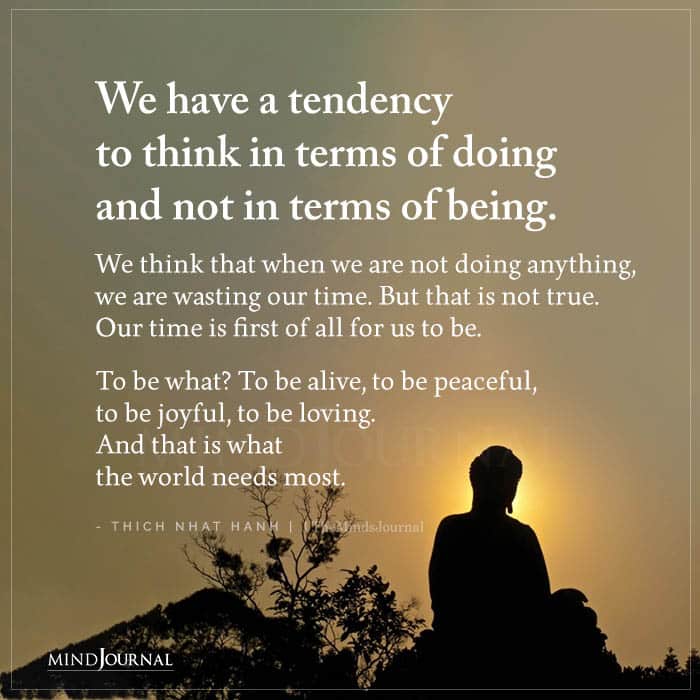
Read Equanimity In Buddhism: Understanding The Fourth Kind of Love
You May Also Like:
- The Love Map: Why You Choose Who You Love
- The Ten Fundamental Rules of Love
- True Love Is Unconditional: A Perfect Marriage Is Not
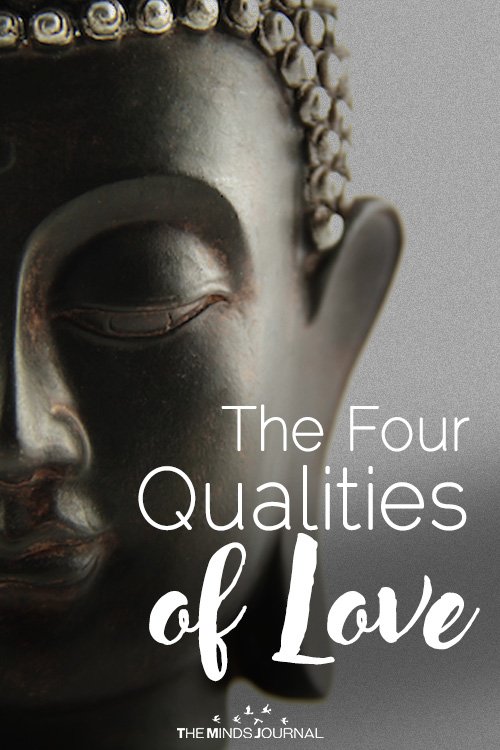
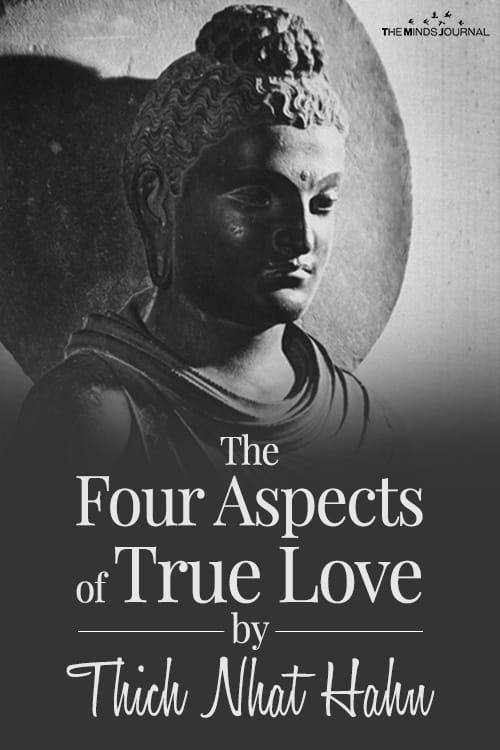








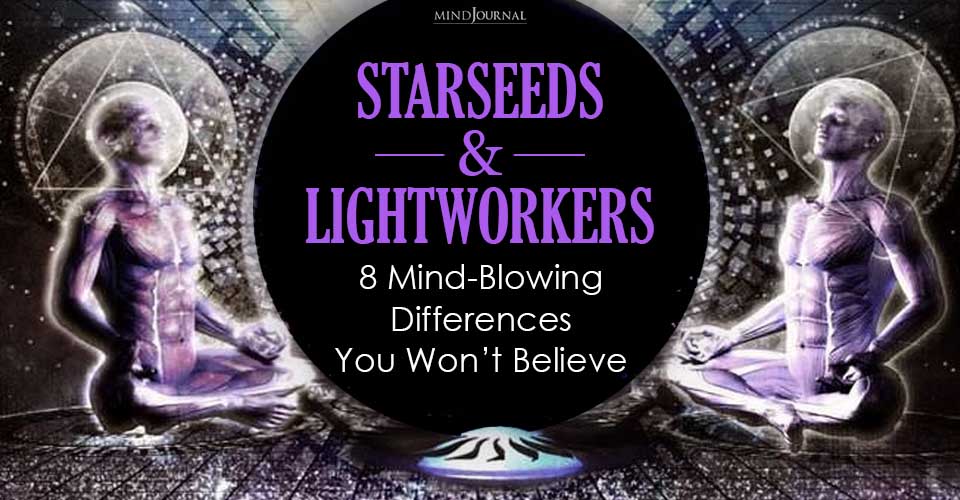

Leave a Reply